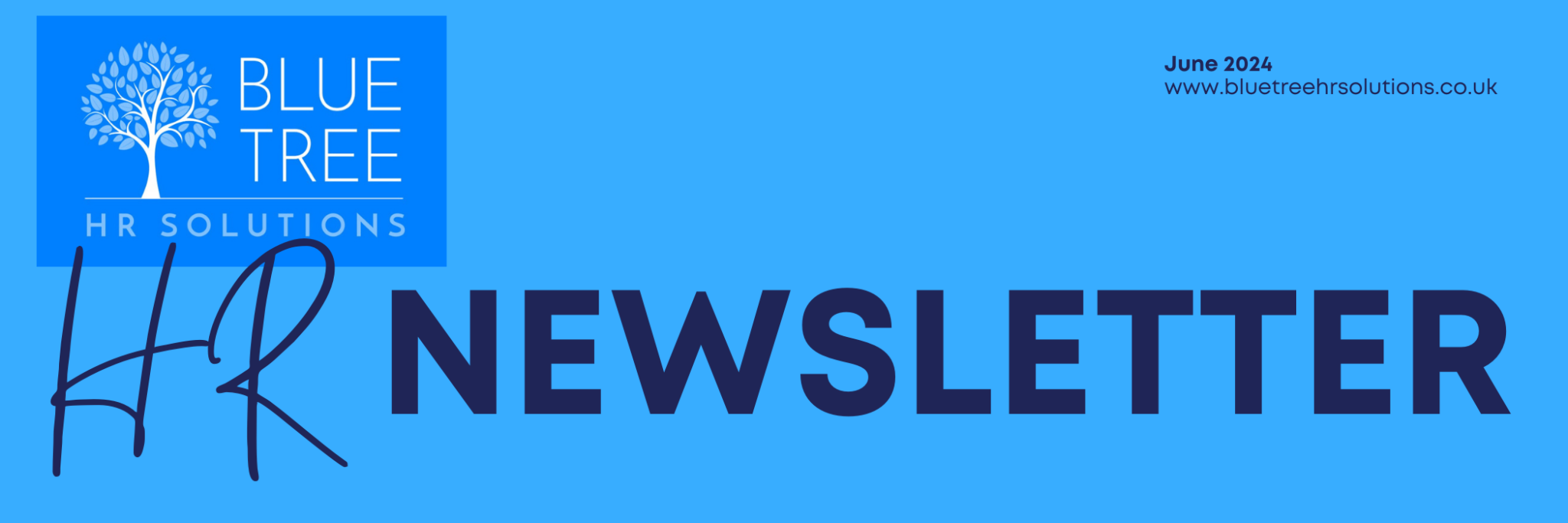 Add My Company
Add My Company
Blue Tree HR Newsletter June 2024

Everything you need to know about menopause in the workplace
Experiencing menopause at work can be challenging for a number of reasons, and the physiological and psychological symptoms of menopause can vary greatly from person to person.
While menopause isn’t explicitly a protected characteristic under the Equality Act 2020, a recent landmark employment tribunal case (Mrs M Lynskey v Direct Line Insurance) found that menopause symptoms can, in fact, be considered a disability if they have a long-term and substantial impact on a woman’s ability to carry out normal day-to-day activities.
A key takeaway from the case is that it may be possible to discriminate against employees experiencing menopause symptoms, by refusing to make reasonable adjustments and by penalising them for poor performance.
The ET ruled that the employer failed to make reasonable adjustments for Mrs Lynskey’s menopausal symptoms – namely: low mood, anxiety, mood swings, poor self-esteem and impact on memory and concentration – and that these symptoms were legally classed as a disability. This led to unfavourable treatment and her resignation.
Case Summary
- The employee joined Direct Line in 2016 and had performed well for four years. However, in 2019, she began to experience menopausal symptoms, including poor concentration and memory issues and was also frequently tearful.
- After initial support, in 2020 she was transferred to a lower paid role, rather than reasonable adjustments being made to her existing role. She struggled with the new job, including difficulty with accessing computer systems, experiencing ‘brain fog’ and struggling for words.
- In 2021, she was told she would not receive a pay rise and her performance was criticised, wrongly attributed to low confidence.
- Subsequently, she was placed on a formal performance-improvement and, although she had repeatedly mentioned her menopausal symptoms, her manager claimed there were no mitigating reasons for her performance.
- She resigned the next year, claiming against Direct Line for unfavourable treatment and lack of reasonable adjustments.
Menopause Policy
Therefore, it is crucial to build an inclusive culture that encourages open discussion about the menopause, along with a supportive environment both in the office and when working at home. Having a menopause policy that educates, informs and helps people show understanding to their colleagues, without awkwardness or embarrassment, is a great place to start.
Our latest guide covers everything you need to know about these changes.
Get in touch for your FREE copy.
Easing the Work-Life load for Deliveroo drivers
Deliveroo has launched two exciting new initiatives to lend a helping hand to its rider community, free and flexible childcare hours and a new education and skills programme.
The partnership with childcare app Bubble offers 15 hours of free childcare to 1,000 riders, allowing them to work flexibly and effectively juggle caring responsibilities with busy schedules. Deliveroo is also teaming up with Lynx Educate to give riders and their families access to over 1,500 educational courses, including languages, data and business management, and sponsoring 100 riders to pursue higher qualification certificates.
These strategies form part of Deliveroo’s ongoing commitment to support rider growth, development and wellbeing, and deliver the kind of benefits that facilitate a good work-life balance. We hope this positive step inspires other leading market giants to consider the best ways to foster a supportive and inclusive environment for their workforce, ease the work-life burden and recognise the importance of career and skills advancement.
https://hrreview.co.uk/hr-news/diversity-news/deliveroo-offers-free-childcare-hours-to-riders/374848
A pain in the neck (and back) for UK Workers
Did you know that, since 2019, the number of cases of neck and back problems causing economic inactivity in the UK has risen by an astonishing 28%?
As highlighted in a recent report by health and safety experts, Blue Trolley, back problems are causing rising economic inactivity across the UK due to long-term sickness. Worryingly, lower-paid employees are particularly vulnerable as they are taking longer periods of sick leave for back issues.
This raises serious concerns about the impact on both individuals and the economy, and shines a light on the need for employers to take preventative and urgent action.
Blue Trolley has provided some valuable guidance for employees and employers to prevent long-term back issues. This includes highlighting the risks associated with work through health and safety training and risk assessments, maintaining good posture and using the right equipment to safely handle heavy goods, taking regular breaks and having a healthy lifestyle. Early intervention and a proactive approach to workplace safety is crucial in mitigating the long-term consequences of back problems in the workforce.
https://hrreview.co.uk/hr-news/28-rise-in-long-term-sickness-from-back-problems/374730
Businesses are increasingly relying on contractors to guide them through the uncertainty of the current economic landscape. Recent findings from specialist recruiters, Robert Walters, reveal that 32% of employers intend to ramp up their hiring of contractors in 2024, attracted by the benefits of flexibility, specialist expertise and cost savings.
Although some challenges persist, the shift towards contracting shows that employers are taking a pragmatic approach to remain competitive and resilient in the face of rapid change.
https://hrreview.co.uk/hr-news/recruitment/1-in-3-employers-lean-towards-hiring-contractors-in-2024/374790
How to celebrate Pride Month without corporate “rainbow washing”
Observed during the month of June, Pride Month is an annual celebration across the globe that celebrates the resilience, diversity and contributions shown by LGBTQ+ communities every day of the year. For employers, it’s an important event and sends a clear message that your organisation is an inclusive place to work where everyone feels valued and respected.
While Pride is notably marked with colourful outdoor parades and marches, displaying a rainbow flag or simply changing your logo could lead to accusations of “rainbow washing”.
This is a term to describe making superficial gestures without authentically showing commitment to LGBTQ+ rights and equality in practice. It can be seen as piggybacking an awareness month, which could lead to anger and disengagement, and it’s also harmful as it detracts from the true meaning of Pride – a protest against discrimination.
Here’s some suggestions for how to meaningfully celebrate Pride Month, avoid backlash and ensure that your efforts during this month can make a positive and lasting impact for your LGBTQ+ colleagues.
- Commit to year-round inclusion. Show a consistent approach by reviewing your policies, initiatives and company benefits to ensure they are fully inclusive.
- Get people involved. Creating, or elevating, your LGBTQ+ Employee Resource Group can transform the experiences of LGBTQ+ people at work. An ERG can provide useful peer-to-peer support, raise awareness and ensure accountability.
- Educate and raise awareness. Consider hosting inclusion workshops with an external LGBTQ+ advocate/expert, or webinars and events that cover the history of the LGBTQ+ movement, to engage and inform people.
- Share stories and realities – Invite colleagues to share their stories and experiences that provide first-hand accounts from a range of LGBTQ+ voices. Allies can then help spread the word that diversity is celebrated by your business.
- Listen to your employees. Avoid falling into the trap of second-guessing what people want. Speaking to your employees – both LGBTQ+ and non-LGBTQ+ – about what inclusion looks like in your business will help ensure your strategy is right and help get people on board with your vision.
If you feel you’ve fallen short, don’t worry! Use Pride Month as an opportunity to pledge your commitment to being a more inclusive workplace.
Adopting these strategies will demonstrate to your organisation that LGBTQ+ inclusion takes place not just during Pride month, but every day of the year.
Q&A
Can I request evidence from an employee requesting statutory carer’s leave?
Put simply, no! The Carer’s Leave Regulations 2024 prohibit employers from requiring an employee to provide evidence to support their request for carer’s leave. Employees do not need to provide proof of their dependents’ care requirements.
If an employee clocks in 10 minutes late, can I make a deduction from their pay?
If it is specifically agreed in the employment contract, you may be able to deduct pay for lateness. However, before any action is considered it’s important to be fair and reasonable; explore the reasons for the lateness with the individual first (i.e. a family emergency) and always follow your own policies.
Can I demote an employee as a result of a disciplinary?
Depending on the reason, a demotion could be an outcome and a reasonable alternative to dismissal, if a contract clause permits this. However, it’s crucial to follow both a fair disciplinary procedure and your company policies to the letter. Always consult with the individual, obtain their agreement and only consider demotion if it’s proportionate to the findings of a full investigation. If justified, a performance improvement may be a suitable option.
For more information on Blue Tree HR Newsletter June 2024 talk to Blue Tree HR Solutions

